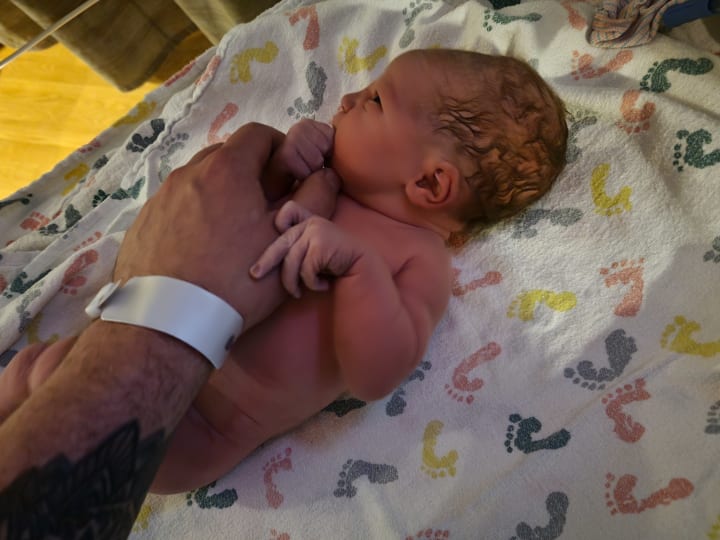So, you’re about to be a Dad™… Part II
The second and final part of my guide for soon-to-be fathers with little to no experience with tiny milk goblins; Things I wish someone had told me before becoming a new father.

INTRO;
Alright, so we’ve already been over the fun stuff (if you haven’t read part I, you can find it here); now it’s time to get into the nitty-gritty; in other words, the bloody, butthole-tearing entrance your little milk goblin is about to make into our Earthly plane. How exciting for you! To be more exact, we will be going over a handful of subjects; these include how to prepare for and what to expect in the delivery room, things you need to do once the dust has settled as soon as possible, general infant care, what you should actually be concerned about, and general milestones.
If you, like me, have no experience with the delivery of a screeching, blood-covered milk goblin from your wonderful partner as she screams in a primal way you’ve never heard before, then this article is for you! Also, knowing when to be concerned about something is vital to keeping those above-average stress levels as low as possible. So, without further ado, here we go…
PART I. How to prepare for the delivery room:
SECTION I. Both you and your partner need to create your “to-go” bags;
Chances are you will be in your birthing suite for at least a few days. According to the nurses and midwives I’ve spoken to, spending an entire week in the hospital is more common, especially if a cesarean section is necessary. So you need to get a bag of clothing, things to pass the hours, baby’s first outfit, and, most importantly, snacks.
Personally, in terms of clothing, I took a couple of pairs of jeans (one of which was already gracing my sweet cheeks), four days' worth of underwear and socks, and a couple of shirts. Your partner won’t need to bring as many clothes changes, as you’d imagine they’ll be in a hospital gown most of the time, but be sure to have them pack a week (or more) of underwear. You should also pack toiletries, like your toothbrush and paste, deodorant, a hair brush, and so on. Pretend you’re going camping, minus bringing cool shit like an axe.
You should also be bringing things to entertain you for what can be hours of sitting around being useless. I took my phone charger and a couple of books, which were nice until the contractions began to make my wife grunt and feel miserable. Until the time comes when you have to hold your partner’s hair while she is vomiting or simply giving her words of encouragement, it’s good to stay entertained and enjoy the last bit of quiet time you’ll be getting for a long, long while.
SECTION II. General preparation;
A few things you can do to help facilitate the birthing process include:
Consider taking birthing classes recommended by your partner’s OB/GYN. We didn’t bother with this, considering I work sixty or more hours a week, and more importantly, because we are lazy. Things worked out just fine without it, but it could very much be something you two should consider.
Practice labor breathing! I had to do the research on this one and have (force) my wife to practice with me (once she stopped laughing at me, breathing like a woman about to rip from her V to her A. Needless to say, I got the last laugh). You can find my notes on these breathing exercises at the end of this article.
Learn what your baby mama wants if x and y. For instance, does your partner want to give birth naturally? Do they want an epidural? If so, at what point? My wife was all for getting any and all drugs available for the delivery of our daughter, something the early twenties I would have been mad proud of, and to be honest, still am.
Agree when you would like to induce and schedule it as soon as your hospital allows you to do so. If this is your baby mama’s first baby, your due date is likely earlier than the milk monster’s birth date. We were able to schedule ours a few days before the due date for eight days after our daughter’s due date, and even then, it took nearly a day of labor for her to shoot out of there finally.
Familiarize yourself with the signs of labor, contractions, and when to head to the hospital. Even if this is her first milk-fueled demon, it's possible that you may have to rocket to the hospital to avoid an unplanned home birth. I didn’t bother doing this, but I probably should before our second goblin.
PART II. What to expect in the delivery room:
SECTION III. Keeping your baby mama as comfortable as possible;
Much of your time in the birthing suite will be boring; until it isn’t… The most important thing you can do throughout the labor process is to be as supportive as possible. And that isn’t just words of encouragement, whatever help those are, but doing your best to keep your baby mama as comfortable as you possibly can. Do anything and everything they need as they need it.
For instance, much of my time was spent helping my wife change positions (Nice), putting her yeti water bottle up to her face (and keeping it full of ice-cold water), ordering food for her when she didn’t feel too sick to eat, and helping her to the bathroom. As labor progressed, these things evolved into having puke bags on standby, punching the epidural button as frequently as possible, and not farting in front of the nurses and our assigned midwife (damn you hospital food). There isn’t a whole lot more for you to be concerned with throughout this process, just do your best to keep your baby mama as comfortable as possible.
Also, pound coffee like a maniac; this could very likely be a long, exhausting time.
SECTION IV. (INCOMING! BABY YODA REFERENCE) *Creepy old Sith bitch voice* I would like to see the child;
Hopefully, things went as well as they can go, and you now have a tiny, beautiful milk goblin in the arms of your baby mama in front of you. NOW GET IT ON THE BEWBS! DO IT NOW! It has been shown (I think?) that throwing your newborn tyrant on the boob immediately is suitable for bonding and can help with nipple confusion. You see, the milk goblin just got here. They don’t know what’s going on; in fact, they know nothing essentially past natural instinct. Even then, their knowledge is choppy at best.
Lastly, your baby mama will have a lot of wild hormones pulsing through their veins, being that they just performed the miracle of life and all. So, despite most (if not all) hospitals not removing the infant from the parent’s room, granted nothing has gone wrong, you stay on that milk monster like stink sticks on shit. My wife was adamant about this one, so I thought I’d put it in this. Once the mother has had a moment to bond with the beh-bay, the nurses will likely place them on a cart with a heater and give them a few shots (vitamin K, Hep), weigh them, and check on their general well-being. I had my hand on her, pictured below, and had to take it off to allow the heat lamp to do its thing.

Following all of this, various nurses will come by while keeping you for a minimum of 24 hours to monitor both the baby and mama. They will want to run a few tests, like a small hearing test. Just stick around with your growing family, and take advantage of any nurses and their knowledge. After 24 hours, they will perform a test (small prick on the milk demon’s ankle) for jaundice. Granted all is well; you’re all Gucci and set to head home. Don’t forget; you must have a car seat to take the baby home! I put the base of mine in a few days before our due date, and the nurses will help you ensure that you strapped the beh-bay in correctly. Don’t listen to bitchy Facebook mom groups like my wife; listen to the nurses. The Facebook moms are a bunch of cunty Karens. There, I said it.
PART III. First week at home and what to remember to do once the dust has settled:
SECTION V. Once you take demon beh-bay home;
It is going to be rough; still, my best advice is to find a groove and ride it. Take shifts, give your baby mama breaks, keeping her as stress-free as possible. She will be doing much of the heavy lifting between feeding and her motherly panache. I made sure to take as much time off as possible while still being paid, over three and a half weeks of vacation well spent. You only get so much time with your newborn, so don’t miss out on any of it. Now, ten weeks later, I’m pushing to get as much overtime as possible to keep those two together as long as possible.
SECTION VI. Things to take care of once the dust has settled;
If you’re lucky enough to live in the bitchin’ US of A like me, health insurance is sort of a point of contention. My job is far from the best in terms of wages, but I’m union, so I get decent health coverage granted I follow procedure, procedures that no one bothered to tell me about. This includes getting my daughter onto my plan, which I only had thirty days to do so. But there is a catch! I needed to provide her social security identification number (which is enough to steal someone’s identity, but apparently not to put her onto my insurance) AND a copy of her birth certificate!
Now, the hospital will provide and deliver the paperwork necessary to generate a birth certificate, but it is up to you to get a copy. According to my local government, receiving a copy via mail takes up to four weeks, so I went to the local three-story records office and had them print me a copy on the spot. It also costs a little less to do it this way, although it was still $25 (why in the FUCK do I pay taxes again?). Now, if only I could find a way to provide such a simple service and charge astronomical prices for a piece of printed paper and a digital database of vital information, that’d be nice.
PART IV. General infant care:
In these sections, I will simply copy the pasta notes I took on my phone for general infant care, labor breathing exercises, and important milestones to lookout for.
SECTION V. General care and when to be concerned;
Feeding:
• Baby should eat every 2-3 hours.
• If breastfeeding, burp everytime you switch boobs.
• If bottlefeeding, burp after each ounce consumed.
• If getting fussy burp her, fart her.
• Wait at least 3 weeks (or until breastfeeding is mastered) to introduce a bottle or pacifier so she doesn't have nipple confusion.
• For a while she will need to be woken up to eat. Eventually she will wake up on her own when she's hungry.
Pooping/peeing:
• Baby should pee 3x a day
• Baby is going to poop a lot. 4x or more/day.
• First few days - tar
• Then green
• Then yellow (strange, mustard seed consistency.
• White poop/blood = potential issue.
Diaper changes:
• She should be pooping each time she eats. Boob milk moves through their small, but rapidly growing bodies apparently.
• Apply diaper cream every diaper change.
Safe sleep:
• Must sleep on back/swaddled with minimal layer of clothes.
• No blankets, no toys, absolutely nothing extra in crib.
• Co-sleep for 6 months.
• Babies sleep... a lot.
Important: if feeling overwhelmed, lay baby down even if crying, for 5-10 minutes and breath, relax.
Umbilical cord:
• It's going to look gross. Simply leave it alone, it will dry and fall off around 1 week. Tiny amount of blood is possible and not to freak us out.
• Concerns (rare) include really red/swelling (infection).
• Keep out of diaper/keep uncovered typically.
Genital care:
• Some vaginal discharge is normal, even tiny bleeding first few days (Katelynns leftover hormones).
Car seats:
• Already in car.
• One layer of clothing in clothing. A jacket could compress on impact and cause Baby to slide out.
• Just tight enough to fold straps with a pinch /\
Keeping Baby healthy:
• Immune system still ramping up, make sure others are relatively healthy/clean. (Hands washed)
When is Baby sick? Doctor if:
• Check temperature if (first 2 months) - missed feedings, extra sleepy, feel hot. If over 100.4 take to pediatrician. Best way of getting temperature is technically rectally, but I should look into an ear one. I wouldn't want my temp checked that way.
• Refusing to eat every 2-3 hours.
• Won't wake up to eat.
• Red or swollen rash on body.
• Crying longer than normal, or unconsolable..
• Vomit (not spitting up).
• Distended tummy.
Mental health (us):
• Call someone if postpartum depression sets in, more than just being a little sad.
• Babies can be really demanding, it is okay if crying a lot to swaddle, lay on back and give yourself 5 minutes.
• Rather than sleep deprived and losing temper above is a good way to chill out.
Bath time:
• When nurses bathe her at hospital, pay attention!
• No soaking bath until her umbilical cord falls off! Until then, give her a sponge bath every few days (extra attention to diaper area, nose and eyes).
• Keep baby's skin clean and moisturized.
Fussy baby:
• Swaddle the baby, or place another way of keeping her warm and snug.
• (After umbilical cord falls off) Let her soak in warm water.
• Snuggling with the baby.
SECTION VI. Labor breathing;
Early labor
"Destresser" Hands on belly,
Deep inhales, long exhales.
Transition labor
Contractions 1+ minute every 2 minutes
DONT PUSH YET
Breathe like Jason Voorhees theme song
(Quick and shallow) in, in, out, out
Pushing labor
"The J breath" (import! No bearing down)
Deep breath through nostrils to ab/utero flex,
Breathe out slowly, while groaning with "ooooooooooooh" sound.
Then baby!
SECTION VII. Milestones;
Month 0-1:
• Mostly sleeping and eating, relies on reflex.
• 5 mins of tummy time/several times a day.
• She will focus eyesight on objects within a foot.
• Reading will help her recognize our voices and the pictures can help development of eyesight.
• Support of neck/head.
Month 1-2:
• Un-clenching of fingers and toes.
• Keep supporting neck.
• Continue tummy time; 5-10 mins now.
• Can start to recognize faces, so smile more. I'll always smile at her.
• More noises than just crying.
• Use a toy/stuffy and move it back and forth in front of her.
Month 2-3;
• She should be able to smile at this point.
• She should be able to lift head/shoulders off floor now.
• Movements should be smooth and deliberate now.
• Mimicking of single syllables.
• Get creative with tummy time (play pens).
• Use a toy/stuffy and move it back and forth in front of her still, but encourage her to reach for it.
• Continue tummy time.
Month 3-4:
• She'll likely be able to roll onto her side and stomach at this point, constant supervision is a must.
• Gaining control of her head, but still wobbly so be careful.
• She will start to understand how to use her hands in tandem to hold things.
• Tummy time is still needed.
• She'll be laughing at a lot of things randomly, just like daddy.
• Narrate what you're doing while around her to encourage verbal development.
Month 5-6:
• Using her hands more.
• Moving and rocking more.
• Rattle socks for hand-eye coordination development.
• Support her while she tries to sit up.
Month 6:
• May be trying to crawl around.
• May be able to sit up on her own.
• Real food now! Well pureed...
• Call her by her name, she should be able to respond to it by now.
• Will be on the lookout for new objects to play with.
• Reading simple books will help with her almost words.
• Some of these milestones take longer.
Month 6-7:
• Sitting up, even able to support her weight with her legs when help upright.
• Her eyesight will include "full-color" as well as more distance.
• Distinguish emotions by tone of voice.
• Transferring objects between hands.
• Show interest in peek-a-boo and mirror images.
Month 7-8:
• Building up core and leg strength, still not walking.
• Easily moving from laying to sitting up, even possibly crawling.
• Babbling much more.
• Separation anxiety setting in; if not already.
• Sleeping roughly 14 hours per day now.
• Boundary pushing by now.
Month 8-9:
• Vocalizing a range of sounds.
• Lifts arms to be picked up.
• Looks for objects when dropped out of sight.
• Bangs things together.
• Use fingers to "rake" food towards herself.
Month 9-10:
• Big theme will be moving and exploring.
• Pulling herself to a standing position.
• "Mama" and "dada" verbalized with intend.
• Use of thumb and forefinger to point, poke, and pickup.
• She can feed herself to an extent (messily), be wary of foods she can choke on.
• Brain is a sponge, one that is starting to understand things. So positivity, reading to her, and showing her how to be a loving person is vital (if not already).
• Rare, but possible, to be walking now. She should be able to take a few assisted steps.
• Responds to "no."
• She should make eye contact and engage with others.
• Awareness of object permanence.
• Don't listen to those comparing her to their kids negatively (especially because their biased as one can be).
Month 10-11:
• More time upright, and moving around (still crawling), exploring much more.
• Standing without support, even a handful of unsupported steps.
• Regularly gesturing with hands.
• 1-2 coherent words.
• Still 14 hours of sleep a day.
• Reduced breastfeeding to 16-20oz/day in favor of solids likes fruit, veggies, grains, yogurts, meats.
• No cows milk or dairy-substitute until after 1st birthday!
Month 11-12:
• Learning to put objects into other objects (like a block into a cup).
• Looks for things she sees us hide (like under a blanket).
• Walks while holding onto things.
• Teach her "wanted behaviors." Use positive reinforcement to these.
Months 12-15:
• Copies othe children.
• Shows us things she likes.
• Claps when excited.
• Hugs stuffed animals/toys (shows affection).
• Gives us hugs, kisses, and cuddles.
• Looks for familiar objects when one of us say the objects name.
• Follows directions given verbally or by gesturing.
• Points to ask for something.
• Her early words are not complete. Repeat and add to what she says. She may say “ba” for ball and you can say “Ball, yes, that’s a ball.”
Months 15-18:
• Moves away from us, looking back to make sure we are close by.
• Points to show us something interesting to her (say the name of what she points to).
• Helps us while being dressed.
• Looks at a few pages of a book with us.
• Tries to say 3 or more words.
• Copying us as we do things.
• Plays with toys in a simple manner (like pushing a car).
• Able to walk without holding onto someone or something.
• Scribbles.
• Tries using utensils.
• Climbs on things…
END:
Hey, if you’ve had the patience to make it through my ramblings you’ve got the patience to be a Dad™. Awesome job, and remember; your baby mama and you are a team. Just do your best, take one step at a time and you’ll be Gucci.
Feel free to reach out at [email protected] or join my subreddit r/AustinPalaoro to talk about dad shit, scifi nerd shit, and all around dope shit. You, your baby mama, and your milk goblin are gonna do great! From my family to yours, we're rooting for you!







Comments
There are no comments for this story
Be the first to respond and start the conversation.